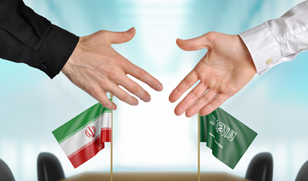Imminent rapprochement or continuation of the boycott?
Hassan Alsarraf
Diplomatic relations between the Islamic Republic of Iran and Saudi Arabia have been severed since 2016 following an attack by angry protesters on Saudi diplomatic missions in Tehran and Mashhad, over the Saudi authorities' execution of 47 people, including Saudi Shia cleric Sheikh Nimr al-Nimr.
The reasons for the tension in Iranian-Saudi relations are not limited to the events of 2016, since the establishment of the Kingdom of Saudi Arabia in 1932 (and even before) and until now events occur from time to time that create a state of tension and conflict between the two countries, in addition to that, there are other periods of time in which a remarkable rapprochement between Iran and Saudi Arabia is noticeable.
The question that may arise in this regard asks what are the causes of tension? What are the reasons for convergence? Which causes are stronger and more likely than others and whichwould be more sustainable?
Before the official establishment of the Kingdom of Saudi Arabia, the Iranian monarchy was very resentful and concerned about the expansion of the Wahhabi movement in the Hijaz, and the deliberate demolition of the graves of the imams of Ahl al-Bayt in Al-Baqi' in 1925 increased this discontent in religious, political and popular circles in Iran.However, Iranian-Saudi diplomatic relations officially began in the summer of 1929 on the basis of a treaty of friendship signed between the two countries.After that, a number ofevents occurred in the following decades that left a significant impact on the nature of Saudi-Iranian relations, perhaps the most important of which is the execution of the Iranian pilgrim (Abu Talib Al-Yazdi) in 1943, as this was followed by a large wave of statements of condemnation and denunciation in Iranian religious and political circles, which resulted in the severance of diplomatic relations between the two countries and the non-participation of Iranian Muslims in the Hajj rituals for four consecutive seasons. Diplomatic relations were restored in 1948.
At the end of Mohammad Reza Pahlavi's reign, Iranian-Saudi relations were at their best: in January 1978, the Shah of Iran made a historic visit to Saudi Arabia and was warmly received by then-King Faisal.
After the Iranian revolution in 1979, a number of events and positions took place that served as new causes of tension between Iran and Saudi Arabia, perhaps the most prominent of which is Saudi support forSaddam's regime in its war against Iran, the exchange of accusations between the two countries of interfering and carrying out terrorist acts, and the killing of pilgrims in Mecca, most of themIranians, in the summer of 1987. , as well as the stampede in Mina in 2015, which killed some 796 pilgrims, 465 of them Iranians.
However, the tension between Iran and Saudi Arabia did not last throughout the Islamic Republic, as relations between the two countries witnessed a state of rapprochement and friendship during the period of Hashemi Rafsanjani (who visited Saudi Arabia more than once) and Mohammad Khatami. Khatami's period is expressed as the golden period in the relationship between Iran and Saudi Arabia, so that Iranian pilgrims in these periods held some religious ceremonies and read supplicationswithout pressure from the Saudi authorities.
The U.S. invasion of Iraq in 2003 and the change in its political system were a major factor in changing the nature of Iranian-Saudi relations, as each country began accusing the other of interfering in Iraq and worsening the security situation in the region. Riyadh has been concerned aboutIranian influence in the Iraqi government, especially during Maliki's tenure, and there are other reasons that have exacerbated tensions, such as Saudi support for the terrorist group Jundullah in Iran, and the events in Yemen in 2009 and 2010. Accusing Iran of attempting to assassinate the Saudi ambassador, assassinating Iranian nuclear scientists, Saudi protests in 2011 and 2012 and accusing Iran of supporting it, and then the grinding wars in Syria and Yemen are all the most important reasons for the perpetuation of tension between Iran and Saudi Arabia.
But according to some statements, including Iraqi Prime Minister Mustafa al-Kadhimi's recent statement, Iranian-Saudi talks are underway, and there is a possibility of an imminent breakthrough and an imminent rapprochement in relations between these two countries. The question that may arise in this regard asks what prevents Saudi-Iranian rapprochement? And about the nature of this imminent rapprochement.
If the two countries look at in their talks the radical differences of the religious, sectarian and ideological aspects, especially those related to the leadership of the Islamic world and control of the region, then it is certain that addressing these differences is not easy, and the reopening of embassies and consulates in the two countries does not necessarily mean addressing these root problems. But in terms of current issues and events in the region, such as what is happening in Yemen and Lebanon, these are the issues that may be addressed after the expected Iranian-Saudi rapprochement.
The important thing to pay attention to is that all the international mediations after 2016 that worked to find reconciliation between Iran and Saudi Arabia did not succeed, as Pakistan, which was the most important mediator country for reconciliation between Iran and Saudi Arabia, did not succeed in its mission, and Iraq as well, despite its efforts from 2019 to 2021, achieved nothing.
But signs of rapprochement have begun since Mohammed bin Salman was disappointed with Western support in confronting Iran, prompting him to declare last March to the American newspaper The Atlantic that "Iran will remain a neighbor of Saudi Arabia and they cannot 'get rid of' each other, and called for "resolving matters" between them, stressing Riyadh's intention to continue talks with Tehran. What confirms this is that US President Joe Biden – according to US media – began to put real pressure on Crown Prince Mohammed bin Salman to re-tame him in light of the unprecedented tension in relations between Washington and Riyadh.
Iran-Saudi Arabia Talks
So far, five rounds of talks have been held between the two countries, and both sides have been very reticent to highlight the details of these talks; it seems that these talks are influenced – in one way or another – by the stages of the nuclear agreement and the outcome of the Russian-Ukrainian war and its impact on geostrategic relations in the region. Observers believe that these talks have recently become close toIranian news agencies published photos of the fifth round of talks showing Iraqi Prime Minister Mustafa Al-Kazemi, Saudi intelligence chief Khalid Al-Humaidan, and Deputy Secretary-General of Iran's National Security Council Saeed Irwani, and publishing such an image in the Iranian media as a positive indicator towards The success of these conversations. According to some circulating and unofficial reports, Iran is counting on the issue of relations with Saudi Arabia in light of the possibility of failure of talks with the West on the nuclear file. On the other hand, Saudi Arabia seeks to obtain some gains from the restoration of relations with Iran, perhaps the most important of which is the resolution of the war in Yemen, which lasted about seven years, which isone of the most important crises facing Mohammed bin Salman.
The energy crisis and the ongoing war in East of yourandBa
An April 21 article in The Washington Post noted an important issue about the impact of the upcoming energy crisis on the nature of the Saudi position vis-à-vis the West. According to this article, written by the Indian-American political analyst Fareed Zakaria, in order to maintain the intensity of its pressure on Russia, and to ensure the success of its sanctions imposed on Moscow, the West has no choice but to restore good relations with Mohammed bin Salman and revive the nuclear agreement. With Iran and lifting sanctions on Venezuela, the West will ensure that oil prices will not rise, by urging Saudi Arabia and other producing countries to raise their oil production. If oil prices are controlled, Western sanctions on Russia will pay off, and Moscow will be isolated and marginalized. But what is strikingis that Saudi Arabia has not yet responded to Western demands to increase production. It has remained committed to the OPEC Plus production level, perhaps due to the coolness of the Saudi-American relationship under Biden. The matter has reached the point of making bin Salman – according to the Washington Post article – work to strengthen relations with China and Russia, and Riyadh's commitment to the level of production agreed upon in OPEC Plus confirms - according to some observers - the existence of a kind of rapprochement between RoSia and Saudi Arabia.
Therefore, if relations between Iran and Saudi Arabia are normalized, and Riyadh strengthens its relations with Beijing and Moscow, we may witness a new reason for the cooling of the relationship between Riyadh and Washington, and this is of course not in the interest of the United States and the West in general, because the success of economic pressure on Russia and its deterrence from aggression against the West dependsor not on controlling energy and oil prices.
If Saudi Arabia does not see guarantees from the United States and if relations with Washington remain as they are, Riyadh is likely to not fully respond toWestern demands. However, the United States has other options in supplementing the troubled oil market through a new opening to Iranian and Venezuelan oil.







